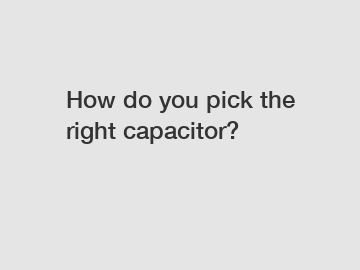Jan. 08, 2024
Electronic Components & Supplies
Goto PINGE to know more.
How do you pick the right capacitor?
Choosing the right capacitor can be a daunting task, especially with such a wide variety of options available in the market today. Capacitors are crucial components used in various electrical and electronic circuits to store and release electrical energy. They come in different types, sizes, and specifications, making it important to understand the key factors to consider when selecting the right capacitor for your specific application. In this article, we will discuss some guidelines that can help you make an informed decision when picking the right capacitor.

Capacitor Types:
1. Electrolytic Capacitors:
Electrolytic capacitors are designed for applications that require higher capacitance values. They have high energy density and are commonly used in power supplies and audio systems. It is important to pay attention to their polarized nature and voltage rating.
2. Ceramic Capacitors:
Ceramic capacitors are compact and versatile, making them suitable for a wide range of applications. They offer stable capacitance over a wide temperature range, making them commonly used in timing circuits, decoupling, and filtering applications.
3. Film Capacitors:
Film capacitors are known for their excellent electrical properties. They offer good stability and accuracy, making them ideal for applications that require precision, such as in coupling, bypassing, and timing circuits. The various film capacitor types include polyester, polypropylene, and polystyrene.
Factors to Consider:
1. Capacitance:
Capacitance is the fundamental property of a capacitor, and it determines the amount of energy it can store. It is essential to calculate or estimate the required capacitance value based on your circuit's needs before making a selection. Incorrect capacitance value can lead to circuit malfunction or inefficiency.
2. Voltage Rating:
Every capacitor has a voltage rating indicating the maximum voltage it can withstand without the risk of failure or breakdown. It is crucial to select a capacitor with a voltage rating higher than the maximum voltage it will experience in your circuit. Failure to do so may result in catastrophic failures, damaging other components.
3. Temperature:
Temperature can significantly affect a capacitor's performance, especially in extreme conditions. Ensure that the selected capacitor is suitable for the expected temperature range of your application. Factors like the dielectric material and construction determine a capacitor's ability to withstand high or low temperatures.
4. ESR and ESL:
Equivalent Series Resistance (ESR) and Equivalent Series Inductance (ESL) are important parameters that affect a capacitor's functionality. ESR determines the internal resistance of a capacitor, affecting its ability to deliver current quickly. ESL, on the other hand, influences the capacitor's response at high frequencies. It is essential to select capacitors with low ESR and ESL values, especially in applications that require high-frequency response or low loss.
In conclusion, selecting the right capacitor requires careful consideration of factors such as capacitance, voltage rating, temperature range, ESR, and ESL. Understanding the specific requirements of your circuit and the different capacitor types available will help you make an informed decision. If you need further assistance or have any specific questions regarding capacitors, please feel free to contact us.
If you want to learn more, please visit our website.
If you want to learn more, please visit our website air compressor capacitor cbb60 250vac 80uf 250v capacitor test.
Previous: What are the pros and cons of COB LED?
If you are interested in sending in a Guest Blogger Submission,welcome to write for us!
All Comments ( 0 )